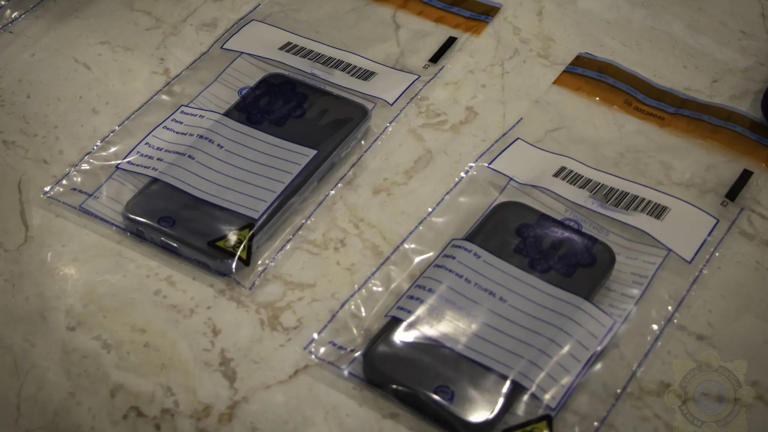France's New Crackdown: Confiscating Phones From Drug Users And Dealers

Table of Contents
The Rationale Behind the New Policy
The French government justifies this policy as a necessary tool in its broader strategy to combat drug-related crime and dismantle organized criminal networks involved in drug trafficking. The core argument centers on the critical role mobile phones play in facilitating drug deals. By seizing these devices, authorities aim to significantly disrupt communication between dealers and clients, making it harder to conduct illegal transactions.
- Reduced communication between dealers and clients: Seizing phones immediately cuts off crucial communication lines, hindering the ability of drug traffickers to coordinate their activities.
- Easier identification and apprehension of traffickers: Phone data can provide valuable leads, identifying other individuals involved in the network and facilitating arrests. Contact lists, messages, and location data become crucial evidence.
- Disruption of online drug markets: The rise of online drug markets necessitates tackling digital communication channels. Confiscating phones directly targets this aspect of drug trafficking.
- Prevention of future drug-related offenses: By disrupting ongoing operations and apprehending individuals, the policy aims to deter future drug-related activities.
Official government statements highlight the policy's focus on targeting organized crime groups and disrupting large-scale drug trafficking operations. While specific examples of successful phone seizures aiding investigations haven't been widely publicized, the government emphasizes the potential for this tactic to yield significant results in dismantling networks.
Legal and Ethical Concerns Surrounding Phone Confiscation
The policy's implementation raises considerable legal and ethical concerns. Critics argue that the immediate confiscation of phones, without a warrant or judicial oversight, constitutes a violation of fundamental privacy rights guaranteed under French and European law.
- Violation of privacy rights under French and European law: The right to privacy is a cornerstone of human rights, and critics question whether this policy adequately respects these rights, especially concerning data stored on confiscated devices.
- Potential for wrongful seizures and accusations: The lack of stringent guidelines could lead to wrongful seizures and accusations, disproportionately affecting vulnerable populations.
- Lack of clear guidelines and oversight mechanisms: The absence of clear procedures and oversight mechanisms increases the risk of misuse and abuse of power by law enforcement.
- Disproportionate impact on vulnerable populations: There are concerns that this policy might disproportionately affect marginalized communities, exacerbating existing social inequalities.
Legal experts and human rights organizations have voiced strong concerns, highlighting the potential for this policy to infringe on fundamental rights and demanding greater transparency and accountability. The absence of clear legal frameworks governing the process and the handling of seized data adds to these concerns.
Practical Implications and Effectiveness of the Policy
Implementing this policy across France presents significant practical challenges. The sheer scale of the undertaking, the resource requirements for law enforcement, and the potential for unintended consequences need careful consideration.
- Feasibility of widespread implementation across France: The logistical challenges of implementing this policy nationwide, particularly in areas with limited resources, are substantial.
- Training and resources needed for law enforcement: Adequate training and resources are essential to ensure the policy is applied fairly and consistently.
- Potential for increased use of encrypted communication methods: Drug traffickers may switch to encrypted communication methods, rendering phone seizures less effective.
- Effectiveness in disrupting drug markets in the long term: The long-term effectiveness of this tactic remains questionable. It's possible that criminals may simply adapt to the new measures.
The experiences of other countries that have employed similar tactics show mixed results. While some have reported successes, others have encountered significant limitations and unintended consequences. A comprehensive evaluation of France's policy is crucial to assess its true impact and long-term effectiveness.
Alternative Strategies to Combat Drug Trafficking
A multifaceted approach is needed to address drug trafficking effectively. Focusing solely on phone confiscation may prove insufficient and neglect other crucial strategies.
- Increased investment in drug education and prevention programs: Prevention is a key aspect of reducing drug use and demand.
- Strengthening international cooperation on drug control: International collaboration is crucial in tackling transnational drug trafficking organizations.
- Focusing on treatment and rehabilitation of drug users: Addressing the root causes of drug use through treatment and rehabilitation programs is essential.
- Targeting the financial networks of drug trafficking organizations: Disrupting the financial flows supporting drug trafficking operations can severely cripple their activities.
Conclusion
France's new policy of confiscating phones from suspected drug users and dealers presents a complex picture. While aiming to disrupt drug trafficking, it raises serious legal and ethical concerns. The long-term effectiveness remains uncertain, demanding a comprehensive evaluation and a balanced approach. Alternative strategies, focusing on prevention, treatment, and international cooperation, must complement this policy for a truly effective fight against drug trafficking. Continued monitoring and evaluation of the effectiveness of France’s new crackdown on drug trafficking, particularly regarding phone confiscation, are crucial. We need a holistic strategy that incorporates various approaches to combat drug trafficking effectively while upholding fundamental rights.

Featured Posts
-
 Pembeli Nft Nike Gugat Perusahaan Minta Kompensasi Rp 84 M
May 29, 2025
Pembeli Nft Nike Gugat Perusahaan Minta Kompensasi Rp 84 M
May 29, 2025 -
 Building A Low Maintenance Living Fence Tips And Tricks
May 29, 2025
Building A Low Maintenance Living Fence Tips And Tricks
May 29, 2025 -
 Stranger Things 5 Everything We Know About The Premiere Cast And Final Season
May 29, 2025
Stranger Things 5 Everything We Know About The Premiere Cast And Final Season
May 29, 2025 -
 Brisbane City Council Cuts Queensland Music Awards Funding After Winning Speech Controversy
May 29, 2025
Brisbane City Council Cuts Queensland Music Awards Funding After Winning Speech Controversy
May 29, 2025 -
 A67 Grashoek Dodelijk Ongeval Met Dodelijke Afloop Slachtoffer Venlo
May 29, 2025
A67 Grashoek Dodelijk Ongeval Met Dodelijke Afloop Slachtoffer Venlo
May 29, 2025
Latest Posts
-
 Elon Musks Daughters New Career A Closer Look
May 30, 2025
Elon Musks Daughters New Career A Closer Look
May 30, 2025 -
 From Silicon Valley To Runway Vivian Musks Journey
May 30, 2025
From Silicon Valley To Runway Vivian Musks Journey
May 30, 2025 -
 Analysis Of Vivian Jenna Wilsons Modeling Debut And Family Life
May 30, 2025
Analysis Of Vivian Jenna Wilsons Modeling Debut And Family Life
May 30, 2025 -
 A Public Feud Bill Gates Serious Allegations Against Elon Musk And The Response
May 30, 2025
A Public Feud Bill Gates Serious Allegations Against Elon Musk And The Response
May 30, 2025 -
 The Musk Gates Dispute Accusations Of Negligence And Child Mortality
May 30, 2025
The Musk Gates Dispute Accusations Of Negligence And Child Mortality
May 30, 2025
